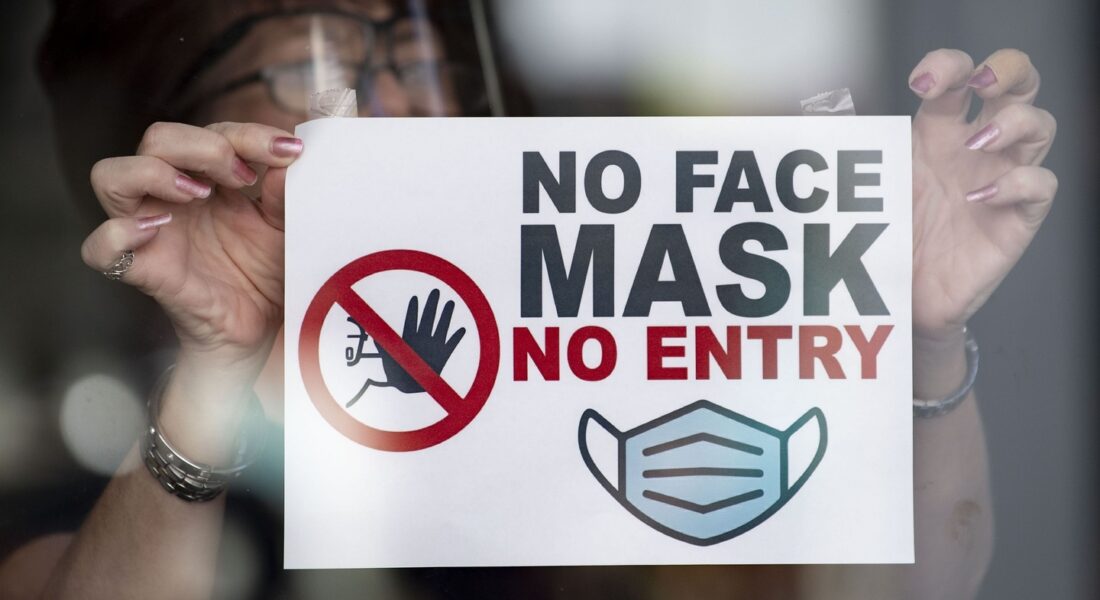PART 1 OF 3
Part 1: KEEPING THE MAIN THING THE MAIN THING
(Why experiencing and extending the kingdom of heaven on earth is all that matters)
Part 2: LOVING CHOICES AND PUBLIC HEALTH
(Why I am personally pro-vaccine while also wanting to respectfully listen to and learn from people who disagree)
Part 3: RULES OF ENGAGEMENT
(Some suggestions on ways to move forward together)
Hi friends. I am asked regularly by a variety of people for my opinion on all things COVID-19, vaccinations, mask-wearing, and government intervention. So I’ve decided to do a short series of blog posts to invite you into my process, for those who might be interested.
In this first post, I want to share some introductory thoughts about my general approach to the topic of submission to government. In part 2, I will share how I interpret the competing voices on the science and sanity of vaccinations and government legislation. In part 3, I will suggest some ways we can all move forward together and will talk more about what it means to “not give up meeting together” according to Hebrews 10:24-25.
The following opinions are those of this participant, and do not necessarily reflect the views of our church, our denomination, or its sponsors. 😉
MY CONFESSION
I should start with a confession: these issues do not interest me as much as they seem to interest many of the people who ask for my opinion or who try to engage me in conversation about it all. Let me explain…
Yes, I believe they are important topics, but not everything that is important is personally engaging to everyone. I am grateful that dentists know dentistry and chemists know chemistry and mechanics know mechanistry, but I don’t personally care to think about or talk about these topics all the time even though I know they are valuable contributors to contemporary life. This is how I feel about most discussions revolving around vaccinations and mask-wearing and government guidelines.
I’m not saying this is a particularly good thing or bad thing about me. It just is. If you find these issues interesting and engaging and you enjoy spending time looking into it all, I am cheering you on! (Better you than me, I think quietly to myself.) 😊
MY STARTING POINT
My default is simple: in every conversation I have, every mental reaction I allow myself, and every interaction I engage in, I want to move with the flow of the Holy Spirit in me, who we know is working to produce more love, more joy, more peace, more patience, more kindness, more goodness, more faithfulness, more gentleness, and more self-control (Galatians 5:22-23).
In every conversation I have, every mental reaction I allow myself, and every interaction I engage in, I want to move with the flow of the Holy Spirit in me.
~ Bruxy Cavey
When it comes to the issues of governmental guidelines during this pandemic, I am happy to do whatever is recommended by our government as long as it does not push me to disrespect, disobey, or deny Christ. Then I can move along happily with my focus put back onto things that more naturally (and supernaturally) occupy my attention – like the mission and message of Jesus and what it means to help people experience and extend the kingdom of heaven on earth. One of my favourite Bible verses helps me keep it simple:
Therefore, holy brothers and sisters, who share in the heavenly calling, fix your thoughts on Jesus.
(Hebrews 3:1)
Amen! We live in a world of infinite distractions, and I find current debates about our government’s approach to healthcare can be added to that long list. My goal is always to find the simplest and most Jesus-centred way forward, the way that helps rather than hinders our calling to keep our thoughts fixed on Jesus.
I pass everything through my mental filter of what matters most to me: helping more and more people learn about and follow Jesus. I am pretty one dimensional that way. A broken record. A one note song. To riff off the first-century Rabbi Hillel: Jesus is life to me; the rest is commentary. That commentary can be helpful support and important backup, but when it starts to overtake the central place in my mental space and prime real estate in conversations with others around me, it becomes distracting noise and I need to re-adjust my focus before my soul begins to shrivel.
Having said that, even though the topics of masks, vaccines, and civil liberties do not directly capture my interest, people do capture my interest, and a lot of people have been asking me about these things. So, what follows in this series of posts is, no doubt in a clumsy and inadequate fashion, me trying to lay out how I’ve been approaching and processing these issues in my mind and my relationships. I am writing this series of posts, not because I like to swim in these conversational waters, but because I am pulled into them regularly by people who ask me questions. With that in mind, I appreciate your grace as I do my best to wade into some waters I don’t usually swim in.
AN OBSERVATION
People tend to be egocentric. And that is completely understandable. But as a community of Jesus People, the Church should be a network of relationships where we challenge one another to push back against this tendency toward self-absorption in all of us, where we encourage and help equip one another to do a better job of loving others around us.
And let us consider how we may spur one another on toward love and good deeds.
(Hebrews 10:24)
The Greek word behind spurring one another on means to jab, poke, or stab someone with something sharp. I love it. Christ-followers are called to provoke one another, to jab one another, to poke and prod one another toward loving well and living well.
Christ-followers are called to provoke one another, to jab one another, to poke and prod one another toward loving well and living well.
~ Bruxy Cavey
But it seems to me that over the past number of COVID-19 dominated months, when our government gives us health guidelines during this difficult time, a common Christian response has been to criticize our leaders while asking ego-centric questions about our rights, our freedoms, our liberties and how we can protect them. I anticipate these kinds of questions from the population at large, but I am disappointed when Christians mimic this mental focus. We ask collectively self-absorbed questions like “What are the exemptions for churches?” or “How are we going to organize ourselves as Christians to stand up for our rights and push back against government overreach?” etc.
Heavy sigh.
It seems to me that our government officials must hold a measure of unhealthy fear of the push-back of religious institutions, since they often make different guidelines for secular vs religious gatherings, usually being more lenient in their restrictions for religious meetings. What are these different standards based on? Government officials must discuss how far they can mandate what they feel is most healthy for our communities before they cross a line and offend too many religious people. Is this really the space we want to occupy in the minds of others when they think of churches in our nation? Do we want to be those people who cause others to walk on eggshells because they don’t want to offend us and draw our ire?
Heavier sigh.
GRATEFUL FOR GOVERNMENT
Providence. That’s the word used to describe how God works through all kinds of means in our world throughout history. This means that Christians can have a generally positive disposition toward institutions and organizations of power, especially governments, not because we find them consistently trustworthy, but because God is consistently trustworthy and he has promised to work through governments even when they are not. Because of Divine Providence, Christians can engage with government all the while looking for ways God might be at work through their decisions.
Christians can have a generally positive disposition toward institutions and organizations of power, especially governments, not because we find them consistently trustworthy, but because God is consistently trustworthy and he has promised to work through governments even when they are not.
~ Bruxy Cavey
We who follow Jesus are inspired by the way Jesus willingly submitted himself to Pontius Pilate, a terrible leader by most standards, saying:
You would have no power over me if it were not given to you from above.
~ Jesus (John 19:11) [For more on this, see here.]
That line from Jesus is super significant. Unless any governing authority asks us to do something that causes us to disrespect, disobey, or deny Christ, we should gladly and gratefully submit to our governments knowing that God is somehow bigger than our governments and is always at work through them. This seems to be an unambiguous New Covenant teaching.
Let everyone be subject to the governing authorities, for there is no authority except that which God has established. The authorities that exist have been established by God.
~ The apostle Paul (Romans 13:1)
Lean into this idea a moment. Let it sink in. We shouldn’t breeze past it. Jesus, and later the apostle Paul, tells us just how big and engaged God is in human affairs, even if we don’t see it on the surface. Let’s not miss the glory of this reality. Let’s celebrate Divine Providence. [For more on Divine Providence, see my post here.]
And we know that in all things God works for the good of those who love him, who have been called according to his purpose.
~ The apostle Paul (Romans 8:28)
When the apostle Paul wrote these words above, in Romans 8 and 12, Nero was Emperor of Rome. And he was a bad man. But Paul had the faith to believe that God was bigger than Rome and was using even poor leadership to accomplish something that played right into God’s larger plan. Lord increase our faith and give us eyes to see.
[An aside: I realize that some Christians believe that the government is mandating that we do dishonour and disobey Christ by not assembling in Sunday services in the same way we have always done, but I’m not buying it and I’ll talk more about that in the last post of this three-part series.]
Yes, there may be times when we must not submit to ungodly government. One time the apostles were warned by the authorities not to publicly proclaim the good news of Jesus. But an angel of the Lord appeared to them in a vision and told them the opposite – to go and tell others about this new life in Christ. Peter and the other apostles made the choice not to submit to the governing authorities, saying:
We must obey God rather than human beings!
~ The apostle Peter (Acts 5:29)
If our government tells us we cannot proclaim Jesus, we will need to make this same apostolic choice, and gladly accept whatever persecution follows. But this story about the apostles is not a blanket permission to ignore the edicts of governments under the banner of “We must obey God rather than men!” We should have the faith to believe that it may be God who is the one instructing us through governments for our own and others’ wellbeing. That is Providence. In most cases, our cry will not be “We must obey God rather than government!” but rather “We must obey God by submitting to government!”
To be clear, I am under no delusion that pharmaceutical companies and secular governments are always acting out of other-centred love and the milk of human kindness. People want to make money and exercise power. I get it. Our Canadian government, like most governments, has often acted in unloving, damage-causing, truth-hiding ways, especially toward indigenous and marginalized people. This lived experience will understandably make many people more hesitant to trust. Whatever the reason behind our trust hesitancy, my encouragement to all Christ-followers is to remember that when we submit to government we are not so much trusting in government as much as we are trusting in God. We are not declaring that government is good, but that God is good and God is great and that in all things God works for our good.
This does not mean that we are never called upon to speak truth to power, only that our prophetic voice must occur within the framework of God’s Providence, which should lead to a disposition of peace in the middle of the storm. Love, even enemy love, is always our motivation rather than fear and its accompanying outrage. (Again, for more on how God’s Providence can lead to our peace, see this post here.)
When we submit to government, we are not so much trusting in government as much as we are trusting in God.
~ Bruxy Cavey
Rome was the government that both Jesus and the apostle Paul were engaged with when they pointed toward God’s overarching plan being worked out through government, and Rome was an unloving, damage-causing, truth-hiding superpower, like every super power before and since.
In his sermon to Greek leaders in Athens, the apostle Paul tells them:
From one man he made all the nations, that they should inhabit the whole earth; and he marked out their appointed times in history and the boundaries of their lands. God did this so that they would seek him and perhaps reach out for him and find him, though he is not far from any one of us.
~ The apostle Paul (Acts 17:26-27)
Wow. God is always arranging national history so that the maximum opportunity exists to encounter and engage with God’s own Self. When we focus on helping people experience and extend the kingdom of heaven on earth, we are moving in the flow of God’s Spirit at work in our world. Then we will have the faith to say along with Joseph, whose life was radically affected by the evil decisions of others around him: “You intended to harm me, but God intended it for good” (Genesis 50:20).
I think this is why the apostle Peter could have the courage and conviction to talk about submission “with all respect, not only to those who are good and gentle, but also to those who are unjust” (1 Peter 2:8), where the word translated “unjust” can mean both harsh and crooked, twisted, or perverse.
The bottom line for me is that it is not my job to police this world and to judge human hearts. (Remember, the hearts of Roman governor Pilate and emperor Nero were apparently quite evil, but somehow God was still working through their leadership.) So, whenever I am tempted to play the role of Judge over the universe, I recall that I am not good at it and the position is taken.
Whenever I am tempted to play the role of Judge over the universe, I recall that I am not good at it and the position is taken.
~ Bruxy Cavey
While mentoring a young pastor to help him guide his church well, the apostle Paul wrote:
I urge, then, first of all, that petitions, prayers, intercession and thanksgiving be made for all people—for kings and all those in authority, that we may live peaceful and quiet lives in all godliness and holiness. This is good, and pleases God our Savior, who wants all people to be saved and to come to a knowledge of the truth. For there is one God and one mediator between God and mankind, the man Christ Jesus, who gave himself as a ransom for all people.
~ The apostle Paul (1 Timothy 2:1-6)
Are we praying for, and thanking God for, our leadership as they try to navigate through this emotionally, relationally, and politically complex season of history? When governmental officials think of the Christian Church in Canada today, do smiles come across their faces and a lightness enter their hearts as they think “Ah, these people are always so grateful and kind toward us”? I have my doubts. And notice too in the above passage how Paul’s mind then moves quickly back to his main focus: joining God in his ultimate desire to see more and more people encounter Christ, our only hope of rescue out of our sin and self-absorption.
OUR REASON FOR BEING THE CHURCH
We have a lot to learn from the first generations of Christ-followers. The early church, persecuted as they were, seemed to have a singular focus of experiencing and extending the kingdom of heaven on earth. The Great Commission (Matthew 28:18-20) was their reason for being. And to accomplish their calling to make disciples of all nations, the first Christians were happy to bend where they could so they could save up their energies to be inflexible where they must. They were brilliantly strategic and refused to be embroiled in debates that could absorb their limited energies and pull them off mission.
The first Christians were happy to bend where they could so they could save up their energies to be inflexible where they must.
~ Bruxy Cavey
For instance:
-
Even though Jesus declared all foods clean (Mark 7:19), the Jerusalem Council recommends gentiles abstain from meat with blood in it out of kindness to their conservative Jewish brothers and sisters (Acts 15:28-29) and the apostle Paul recommends restricting our New Covenant liberties if it causes division in the Body of Christ (Romans 14:1-15:7).
-
Although a religious mandate to get circumcised could potentially compromise the gospel (see the book of Galatians), Paul would still circumcise Timothy (awkward!) to help advance the gospel (Acts 16:1-3).
-
Even though the need for animal sacrifice is done away with under the New Covenant (Hebrews 10:1-18), the apostle Paul would participate in the temple sacrificial system on at least one occasion in order to dispel the misunderstanding that he had become anti-Jewish (Acts 21:22-26).
-
Although the New Covenant allows for freedom of expression in appearance (John 7:24), Paul counselled men and women to follow cultural guidelines for showing respect (1 Corinthians 11).
-
And even though paying taxes to Rome might fund a government that was far from God-honouring, Jesus encouraged paying taxes as a practical expression of submission (Matthew 22:15-22) and the early church followed this practice as an act of honour (Romans 13:6-7).
Once again: the early Church would bend wherever they could while being inflexible wherever they must.
So, for my sisters and brothers who might not be personally convinced by the science behind vaccinations and masks (more about this in our next post) or fear that our government is overreaching in its legislation, the bottom line for me is that if it isn’t an issue essential to the gospel, I would hope we could at least comply for the sake of living “peaceful and quiet lives in all godliness and holiness” (1 Timothy 2:2).
Let us not care about our rights as Canadian citizens as much as we care about our responsibilities as ambassadors of the Jesus Nation.
~ Bruxy Cavey
Let us not care about our rights as Canadian citizens as much as we care about our responsibilities as ambassadors of the Jesus Nation, and about making the most of every opportunity we might have to share the good news of Jesus.
Grace and Peace,
Bruxy
NEXT POST COMING SOON…
Part 2: LOVING CHOICES AND PUBLIC HEALTH (Why I am personally pro-vaccine while also wanting to respectfully listen to and learn from people who disagree)




